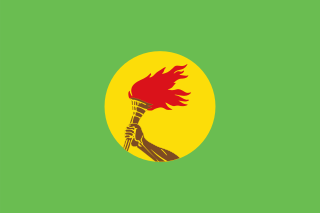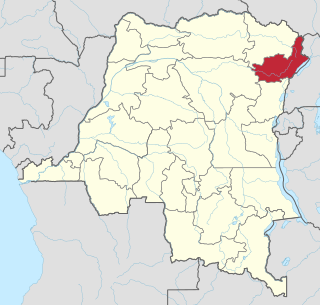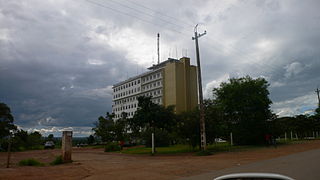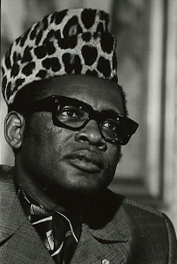| |||||
| Decades: | |||||
|---|---|---|---|---|---|
| See also: | History of Zaire | ||||
The following lists events that happened during 1984 in Zaire .
| |||||
| Decades: | |||||
|---|---|---|---|---|---|
| See also: | History of Zaire | ||||
The following lists events that happened during 1984 in Zaire .
| Date | event |
|---|---|
| The Civil Guard is established with responsibility for border security, the fight against illegal traffic and terrorism, and the restoration of public order. [1] | |
| 29 July 1984 | Mobutu Sese Seko is the only candidate in the 1984 Zairean presidential election. 99.16% support his candidacy. |

Zaire, officially the Republic of Zaire, was the name of the Democratic Republic of the Congo from 1965 to 1997. Zaire was located in Central Africa and was, by area, the third-largest country in Africa, and the 11th-largest country in the world. With a population of over 23 million inhabitants, Zaire was the most populous officially Francophone country in Africa, as well as one of the most populous in Africa.
Mpinga Kasenda was a political figure in Zaire under Mobutu Sese Seko. Kasenda was the prime minister of Zaire from 1977 to 1979 and the foreign minister from 1993 to 1994. He was killed in a plane crash near the airport in Kinshasa.

The Hema people or Bahema (plural) are an ethnic group of Nilotic origin who are concentrated in parts of Ituri Province in the eastern Democratic Republic of the Congo.

The University of Lubumbashi, also known by the acronym UNILU, is one of the largest universities in the Democratic Republic of the Congo. It is located in Lubumbashi in Haut-Katanga Province, previously Katanga Province. The campus is located in the northern part of the city, west of the airport.

Haut-Congo Province was a province of the Republic of the Congo (Léopoldville), now the Democratic Republic of the Congo. It was formed in April 1962 from part of the Orientale Province. In 1966 it was merged back into the reconstituted Orientale Province.

The Manifesto of N'sele was a political document issued in the Democratic Republic of the Congo on 19 or 20 May 1967 which set out the official political stance of the Popular Movement of the Revolution, a political party which had been founded by Joseph-Désiré Mobutu in 1966. The manifesto was created at an MPR meeting in N'sele, Kinshasa where it was based.
The Baboa people are an ethnic group in the Democratic Republic of the Congo. They speak the Bwa language.
The Sanga people are an ethnic group that lives mostly in the Katanga Province of the Democratic Republic of the Congo.

The People's Palace or Palace of the People is the seat of the National Assembly and the Senate in Kinshasa, Democratic Republic of Congo, formerly Zaire. It was completed in 1979 with a line of credit from the People's Republic of China. It has witnessed key moments in the country's political landscape, bearing witness to historic debates, legislative triumphs, and the exercise of democratic values. The building serves as a gathering place for lawmakers and a venue for official ceremonies.

Coffee production in Democratic Republic of the Congo (DRC) is centered in the Lake Kivu provinces. There are about 11,000 coffee farmers in the country who produce two main varieties of coffee, Robusta and Arabica.

The Constitution of Zaire, was promulgated on 15 August 1974, revised on 15 February 1978, and amended on 5 July 1990. It provided a renewed legal basis for the regime of Mobutu Sese Seko who had emerged as the country's dictator after the Congo Crisis in 1965.
Joseph N'Singa Udjuu Ongwabeki Untubwe was a Congolese politician. He served as the First State Commissioner of Zaire from 23 April 1981 to 5 November 1982. From 1966 to 1969, he also served as Minister of Justice.

Bas-Uele District was a district of the Belgian Congo and the Democratic Republic of the Congo. It was formed from part of Uele District in 1912. Later it was merged back into Uele District, then split out again. There were various boundary changes. It roughly corresponded in area to the present Bas-Uélé province.
Crispin Mulumba Lukoji, was a Congolese politician. An academic by profession, he became Prime Minister of Zaire on 1 April 1991 after Lunda Bululu resigned. He was relatively unknown prior to his selection, but was praised for his economic acumen. His appointment was seen as a move to cause opposition leaders Étienne Tshisekedi and Jean Nguza Karl-i-Bond to lose support. Lukoji oversaw the National Conference in August 1991 that led to democratization. He was criticized for being too close to President Mobutu Sese Seko and rapidly lost support by opposition forces. Lukoji was forced to resign on 29 September 1991 amid civil unrest. He died in Johannesburg on 3 March 1997.
The following is a timeline of the history of the city of Kisangani, Democratic Republic of the Congo.
Joseph Ngalula Mpandajila is a Congolese writer and politician.

The Zairian Civil Guard was a militarised police force in Zaire, created to support the regime of Mobutu Sese Seko.
Ivonne Marie Claire Botuli-Bolumbu, known as Ikole Botuli-Bolumbu was a poet from the Democratic Republic of the Congo.
The following lists events that happened during 1901 in the Congo Free State.
The following lists events that happened during 1995 in Zaire.